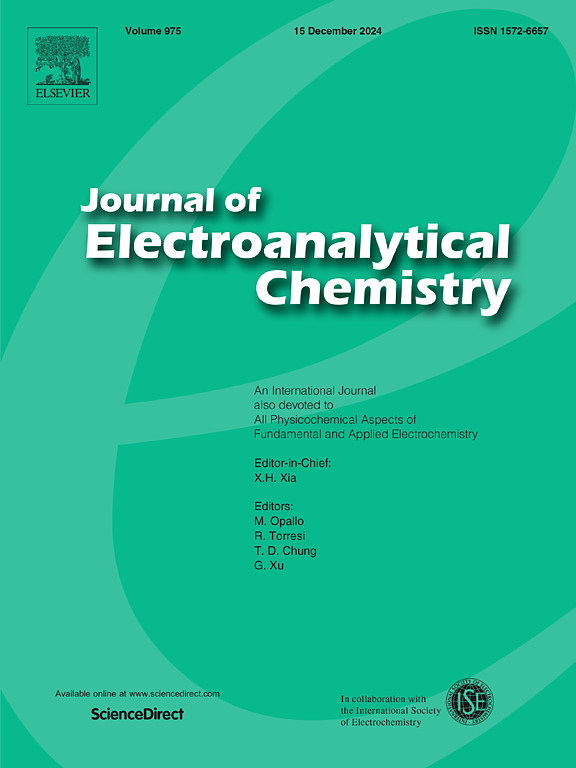硼酸锂钙电极具有优异的电容保持性能,适用于高性能超级电容器
IF 4.1
3区 化学
Q1 CHEMISTRY, ANALYTICAL
引用次数: 0
摘要
硼酸锂钙(LiCaBO3)是一种新兴材料,具有储能系统的巨大潜力,尽管尚未得到广泛的研究。由于锂、钙和硼的存在,它具有多功能特性。LiCaBO₃具有结构稳定性高、离子电导率好、循环寿命长、成本低、合成环境友好等优点,是下一代超级电容器和混合储能系统的理想候选者。在这项研究中,LiCaBO₃首次在文献中作为超级电容器电极材料进行了研究。成功合成了该材料,并通过XRD、XPS、SEM/EDX和BET分析证实了该材料的形成。循环伏安法(CV)分析表明,在扫描速率为1 mV s−1时,电极的最大面电容为37 mF cm−2。此外,在10,000次充放电循环后,LiCaBO₃电极保留了其初始电容的95.4%,表现出优异的循环稳定性,仅损失4.6%。这种性能水平突出了LiCaBO₃在高效储能应用中的强大潜力。本文章由计算机程序翻译,如有差异,请以英文原文为准。
Lithium calcium borate electrode with excellent capacitance retention for high-performance supercapacitor application
Lithium Calcium Borate (LiCaBO3) is an emerging material with significant potential for energy storage systems, although it has not yet been widely investigated. Owing to the presence of lithium, calcium, and boron, it offers multifunctional properties. Advantages such as high structural stability, good ionic conductivity, long cycle life, low cost, and environmentally friendly synthesis make LiCaBO₃ a promising candidate for next-generation supercapacitors and hybrid energy storage systems. In this study, LiCaBO₃ was investigated for the first time in the literature as a supercapacitor electrode material. The material was successfully synthesized, and its formation was confirmed through XRD, XPS, SEM/EDX, and BET analyses. Cyclic voltammetry (CV) analysis revealed that the electrode exhibited a maximum areal capacitance of 37 mF cm−2 at a scan rate of 1 mV s−1. Furthermore, after 10,000 charge–discharge cycles, the LiCaBO₃ electrode retained 95.4 % of its initial capacitance, demonstrating excellent cycling stability with only a 4.6 % loss. This level of performance highlights the strong potential of LiCaBO₃ for use in high-efficiency energy storage applications.
求助全文
通过发布文献求助,成功后即可免费获取论文全文。
去求助
来源期刊
CiteScore
7.80
自引率
6.70%
发文量
912
审稿时长
2.4 months
期刊介绍:
The Journal of Electroanalytical Chemistry is the foremost international journal devoted to the interdisciplinary subject of electrochemistry in all its aspects, theoretical as well as applied.
Electrochemistry is a wide ranging area that is in a state of continuous evolution. Rather than compiling a long list of topics covered by the Journal, the editors would like to draw particular attention to the key issues of novelty, topicality and quality. Papers should present new and interesting electrochemical science in a way that is accessible to the reader. The presentation and discussion should be at a level that is consistent with the international status of the Journal. Reports describing the application of well-established techniques to problems that are essentially technical will not be accepted. Similarly, papers that report observations but fail to provide adequate interpretation will be rejected by the Editors. Papers dealing with technical electrochemistry should be submitted to other specialist journals unless the authors can show that their work provides substantially new insights into electrochemical processes.

 求助内容:
求助内容: 应助结果提醒方式:
应助结果提醒方式:


